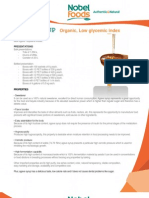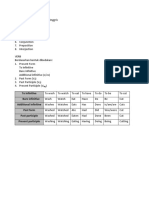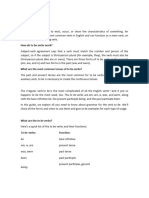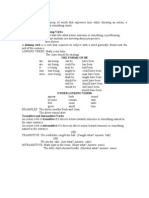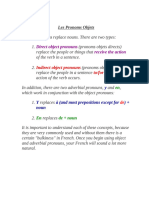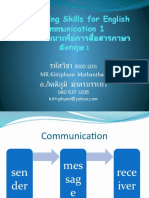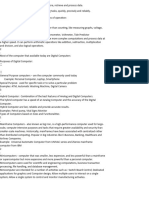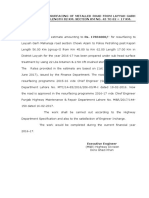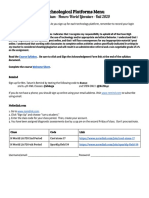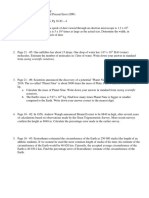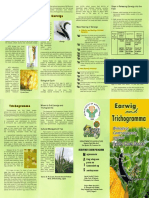0 ratings0% found this document useful (0 votes)
29 viewsVerb To Be: Why Is It Essential To Learn The Verb To Be? and What Is?
Verb To Be: Why Is It Essential To Learn The Verb To Be? and What Is?
Uploaded by
Sharemmy PMThe document discusses the importance of learning the verb "to be" in English. It explains that "to be" is an irregular verb that changes form across its conjugations. It then provides the conjugations of "to be" in the present, past, perfect, and progressive tenses. Specifically, it states that in the present tense, the verb is conjugated as "I am, you are, he/she/it is, and we, you, they are." In the past tense, most pronouns are conjugated with "were" except for "I, he, she, it" which use "was."
Copyright:
© All Rights Reserved
Available Formats
Download as PDF, TXT or read online from Scribd
Verb To Be: Why Is It Essential To Learn The Verb To Be? and What Is?
Verb To Be: Why Is It Essential To Learn The Verb To Be? and What Is?
Uploaded by
Sharemmy PM0 ratings0% found this document useful (0 votes)
29 views1 pageThe document discusses the importance of learning the verb "to be" in English. It explains that "to be" is an irregular verb that changes form across its conjugations. It then provides the conjugations of "to be" in the present, past, perfect, and progressive tenses. Specifically, it states that in the present tense, the verb is conjugated as "I am, you are, he/she/it is, and we, you, they are." In the past tense, most pronouns are conjugated with "were" except for "I, he, she, it" which use "was."
Original Title
to-be
Copyright
© © All Rights Reserved
Available Formats
PDF, TXT or read online from Scribd
Share this document
Did you find this document useful?
Is this content inappropriate?
The document discusses the importance of learning the verb "to be" in English. It explains that "to be" is an irregular verb that changes form across its conjugations. It then provides the conjugations of "to be" in the present, past, perfect, and progressive tenses. Specifically, it states that in the present tense, the verb is conjugated as "I am, you are, he/she/it is, and we, you, they are." In the past tense, most pronouns are conjugated with "were" except for "I, he, she, it" which use "was."
Copyright:
© All Rights Reserved
Available Formats
Download as PDF, TXT or read online from Scribd
Download as pdf or txt
0 ratings0% found this document useful (0 votes)
29 views1 pageVerb To Be: Why Is It Essential To Learn The Verb To Be? and What Is?
Verb To Be: Why Is It Essential To Learn The Verb To Be? and What Is?
Uploaded by
Sharemmy PMThe document discusses the importance of learning the verb "to be" in English. It explains that "to be" is an irregular verb that changes form across its conjugations. It then provides the conjugations of "to be" in the present, past, perfect, and progressive tenses. Specifically, it states that in the present tense, the verb is conjugated as "I am, you are, he/she/it is, and we, you, they are." In the past tense, most pronouns are conjugated with "were" except for "I, he, she, it" which use "was."
Copyright:
© All Rights Reserved
Available Formats
Download as PDF, TXT or read online from Scribd
Download as pdf or txt
You are on page 1of 1
VERB TO BE
WHAT IS IT? HOW IS IT COMPLEMENTED?
EVERYTHING IMPORTANT
WHY IS IT ESSENTIAL TO LEARN THE VERB TO BE?
and what is?
The verb to be is an irregular verb, this means that, unlike regular verbs in English where
the root of the verb is always kept, it changes its way of being written in almost all its
conjugations.
When you start studying English, one of the most basic things you have to learn is how to
use the verb to be in English. You find numerous sentences that carry the verb to be in
English, with different meanings, and it might be a bit difficult, but pay attention to the
basics you should know about the conjugation of the verb to be.
In essence, the verb to be may appear alone, but in most cases it will accompany other
verbs in compound tenses. But first the basics, let's look at the conjugation of to be verb.
In the present, the verb is conjugated I am, you are, he / she / it is, and with the plural
pronouns we, you, they is conjugated with are. In the past tense, most of the pronouns
are conjugated with were except I, he, she, it which are conjugated with was. In the
perfect forms (or past participle) it takes the form been, and in the progressive form it
becomes being.
VERBAL TENMS OF THE VERB TO BE IN
ENGLISH
El verbo to be en presente se utiliza principalmente para hacer referencia a
algo verdadero en el presente o para dar información básica. Las formas
del verbo en presente son am, is, are.El verbo to be en pasado se usa para
hablar de información verdadera, hechos o datos que sucedieron en el
pasado. El verbo toma la forma de was y were, dependiendo del
pronombre personal con el que se conjugue. El verbo to be en futuro
utiliza la forma will be y se utiliza para hablar de algo que será o estará en
el futuro.
EJEMPLOS Y FRASES CON EL VERBO TO
BE
Verb to be in the present affirmative, question and negation
Peter is hungry. (Peter tiene hambre.)
Is Peter hungry? (¿Peter tiene hambre?)
Peter is not hungry. (Peter no tiene hambre.)
Verb to be in the past affirmative, negative and question
Barry was ill. (Barry estaba enfermo.)
Barry was not ill. (Barry no estaba enfermo.)
Was Barry ill? (¿Barry estaba enfermo?)
Verbo to be en future afirmativo, negativo y pregunta
AThe game will be tomorrow at ten o’clock. (El partido será mañana a las diez.)
The game will not be tomorrow at ten o’clock. (El partido no será mañana a las diez.)
Will the game be tomorrow at ten o’clock? (¿El partido será mañana a las diez?)
THE VERB TO BE IN GENERAL ARE
those that go hand in hand with the subject
i am they are
you are
he ir
she is
it is
we are
you are
You might also like
- Great Writing 5 (5th Edition) : From Great Essays To Research - Answer KeyDocument17 pagesGreat Writing 5 (5th Edition) : From Great Essays To Research - Answer KeyVu Dang77% (26)
- 2000 Most Common Turkish Words in Context: Get Fluent & Increase Your Turkish Vocabulary with 2000 Turkish PhrasesFrom Everand2000 Most Common Turkish Words in Context: Get Fluent & Increase Your Turkish Vocabulary with 2000 Turkish PhrasesNo ratings yet
- Organic Agave Syrup Technical Data SheetDocument4 pagesOrganic Agave Syrup Technical Data SheetEduardo LuboNo ratings yet
- Subject-Verb - AgreementDocument14 pagesSubject-Verb - AgreementAhmad Abdillah AsriNo ratings yet
- English For Kids: Verb To BeDocument12 pagesEnglish For Kids: Verb To BeWilber Alberto RodriguezNo ratings yet
- YOSANDocument9 pagesYOSANBahabol YosanNo ratings yet
- MODULE For Grammar and VocabularyDocument36 pagesMODULE For Grammar and Vocabularycharizetante219No ratings yet
- Verb To:: in The Present Affirmative, Question and NegationDocument2 pagesVerb To:: in The Present Affirmative, Question and NegationjorgeNo ratings yet
- Verb To BeDocument1 pageVerb To BePeak TraaNo ratings yet
- Ingles IDocument6 pagesIngles IFernanda MoralesNo ratings yet
- Rangkuman B Ing SDDocument6 pagesRangkuman B Ing SDaryani tri iswariNo ratings yet
- Foundation Class 1: Mureed Hussain JasraDocument48 pagesFoundation Class 1: Mureed Hussain JasraMuhammad SaeedNo ratings yet
- Introduce Yourself:: Thanks For Your AttentionDocument5 pagesIntroduce Yourself:: Thanks For Your Attentionkaterine mosqueraNo ratings yet
- Correlative ConjuctionsDocument26 pagesCorrelative ConjuctionsSerryNo ratings yet
- Is My Writing Formal Enough?Document9 pagesIs My Writing Formal Enough?deutschhamsterNo ratings yet
- Fase 2 Ingles WritingDocument13 pagesFase 2 Ingles Writingkaterine mosqueraNo ratings yet
- Trabajo de Ingles Pasado SimpleDocument31 pagesTrabajo de Ingles Pasado SimpleCarlos Felipe AyaujaNo ratings yet
- English PPT VDocument10 pagesEnglish PPT Vshresthahardik03No ratings yet
- Guia Grammar InglesDocument22 pagesGuia Grammar InglesFernando PeronNo ratings yet
- Lesson3 Part1 PDF v2.0Document24 pagesLesson3 Part1 PDF v2.0f4bm8r5ypxNo ratings yet
- Verb TenseDocument16 pagesVerb TenseRose Bt MustafhaNo ratings yet
- Commonly Confused Words: Brought To You by Your AC I 160 / PC 247Document18 pagesCommonly Confused Words: Brought To You by Your AC I 160 / PC 247Haroon GhaniNo ratings yet
- Verb TenseDocument16 pagesVerb Tensemp SinghNo ratings yet
- A1 Support Focus On The Learner Error Grid (Draft)Document3 pagesA1 Support Focus On The Learner Error Grid (Draft)eladani OmerNo ratings yet
- The Verb To Be Todo en InglesDocument6 pagesThe Verb To Be Todo en InglesrulandNo ratings yet
- The WH Words Are For Asking and Stating IdeasDocument18 pagesThe WH Words Are For Asking and Stating IdeasjoseNo ratings yet
- Verbs 20231004 162137 0000Document51 pagesVerbs 20231004 162137 0000Valentina Trivel QuirogaNo ratings yet
- English For Academic and Professional Purposes - Module 6Document7 pagesEnglish For Academic and Professional Purposes - Module 6almafebe caselNo ratings yet
- The Verb To BeDocument10 pagesThe Verb To BepaoNo ratings yet
- 11 1 VERBS ReadingDocument7 pages11 1 VERBS ReadingJean Pierre MoralesNo ratings yet
- VerbDocument2 pagesVerbAnonymous tyEGT2RJJUNo ratings yet
- The Verb To BeDocument11 pagesThe Verb To BeBrenda MolinaNo ratings yet
- Present Tenses Intermediate LevelDocument3 pagesPresent Tenses Intermediate Levelnagdee.bNo ratings yet
- Colorful Playful Creative Portfolio PresentationDocument22 pagesColorful Playful Creative Portfolio Presentationkjm4r2cbhtNo ratings yet
- Helping VerbsDocument3 pagesHelping Verbskrishnachivukula100% (1)
- Reviewer in Linguistics Pre FinalsDocument13 pagesReviewer in Linguistics Pre FinalsVanessa LagrimasNo ratings yet
- Lesson About Verbs by Kiev B. AlmiraDocument31 pagesLesson About Verbs by Kiev B. AlmiraKiev Barredo AlmiraNo ratings yet
- Resumen Cudro VerbalesDocument3 pagesResumen Cudro Verbalesledesma.natalia.sNo ratings yet
- Phrasal Verbs - Class #1Document14 pagesPhrasal Verbs - Class #1Nerio Cabrera CubasNo ratings yet
- Add - Ness To Form Nouns From AdjectivesDocument6 pagesAdd - Ness To Form Nouns From Adjectiveszahra saoudiNo ratings yet
- Les Pronoms ObjetsDocument14 pagesLes Pronoms ObjetsJudy Wing-Yuen LamNo ratings yet
- AtmaDocument3 pagesAtmasuriyatiiyunNo ratings yet
- b1 Level Vocabulary Strategy Training-part IIDocument28 pagesb1 Level Vocabulary Strategy Training-part IIcihangir46kNo ratings yet
- The 8 Parts of SpeechDocument8 pagesThe 8 Parts of Speechxxa0No ratings yet
- Thuyết trình GDCD -Tổ 4Document23 pagesThuyết trình GDCD -Tổ 4VCO Đặng Nhật MinhNo ratings yet
- Verb PhrasesDocument7 pagesVerb PhrasesSalsaNo ratings yet
- Inglês Gramática 1°Document24 pagesInglês Gramática 1°Izadora AraújoNo ratings yet
- VerbDocument3 pagesVerbtitechan69No ratings yet
- VERBSDocument28 pagesVERBSRaven Adrienne DimaculanganNo ratings yet
- Subject Verb AgreementDocument1 pageSubject Verb AgreementMuslem UddinNo ratings yet
- EnglishDocument9 pagesEnglishapi-354037574No ratings yet
- Introduction To Phrasal and Auxiliary VerbsDocument11 pagesIntroduction To Phrasal and Auxiliary VerbsSai paavan ChunduruNo ratings yet
- 5C English C1Document53 pages5C English C1Ronnyy Cassimiroo LamassNo ratings yet
- Kel 6 Bhs InggrisDocument6 pagesKel 6 Bhs InggrisFriskaLubisAzahra SNo ratings yet
- Developing Skills For English Communication 1Document31 pagesDeveloping Skills For English Communication 1kittiphumNo ratings yet
- Prepositional PhrasesDocument8 pagesPrepositional PhrasesGc TereNo ratings yet
- Le Verbe To Do en AnglaisDocument10 pagesLe Verbe To Do en AnglaisHermine KaraNo ratings yet
- 01 A Inglesa: LínguaDocument14 pages01 A Inglesa: LínguaEfraim CostaNo ratings yet
- Verbs and Their FormsDocument19 pagesVerbs and Their FormsvnstdnNo ratings yet
- VerbDocument21 pagesVerbrakeshme7No ratings yet
- Uses of The Simple PastDocument5 pagesUses of The Simple Pastmom2208No ratings yet
- Math Thesis Titles PhilippinesDocument8 pagesMath Thesis Titles PhilippinesBuyPapersOnlineForCollegeUK100% (2)
- Metabolisme Protein Dalam Tubuh ManusiaDocument9 pagesMetabolisme Protein Dalam Tubuh ManusiaFirly AlimansyahNo ratings yet
- Junior High School Students Scientific Literacy On Earth Science ConceptDocument6 pagesJunior High School Students Scientific Literacy On Earth Science ConceptAnastacia Anne Eva CambaNo ratings yet
- PHYSICAL-SCIENCE Propagation-of-LightDocument27 pagesPHYSICAL-SCIENCE Propagation-of-LightEuphiemia SamonteNo ratings yet
- Butterfly Valve Selection-Velocity Chart: HDU/HD Series ValvesDocument2 pagesButterfly Valve Selection-Velocity Chart: HDU/HD Series Valveseder_peruchNo ratings yet
- Unit 8.2Document5 pagesUnit 8.2hong nguyenNo ratings yet
- The Way To Win Cross-Border Allainces: Submitted By: Naresh Bhole PGPJ03031 Nischal Upreti PGPJ03034 Group 7Document13 pagesThe Way To Win Cross-Border Allainces: Submitted By: Naresh Bhole PGPJ03031 Nischal Upreti PGPJ03034 Group 7Nischal UpretiNo ratings yet
- Ict-Grade-9 SummaryDocument7 pagesIct-Grade-9 SummaryGlitz Wyn Victor SobisolNo ratings yet
- By Mrinal Marwaha & Amit Goel Group 7Document13 pagesBy Mrinal Marwaha & Amit Goel Group 7Mrinal Marwaha100% (1)
- Chapter 15 - MINING MEANING FROM TEXTDocument20 pagesChapter 15 - MINING MEANING FROM TEXTSimer FibersNo ratings yet
- Design & Build A Milliohm Meter - ScullcomDocument24 pagesDesign & Build A Milliohm Meter - ScullcomVerne ThomysNo ratings yet
- CE UNIT-1 MATERIAL PDFDocument17 pagesCE UNIT-1 MATERIAL PDFbvinnuroiroi467No ratings yet
- Sad 500 - Customs Declaration Form: KOM ADocument1 pageSad 500 - Customs Declaration Form: KOM Aalsone07No ratings yet
- Impact of Dividend Policy On Firm Performance: An Empirical Evidence From Pakistan Stock ExchangeDocument7 pagesImpact of Dividend Policy On Firm Performance: An Empirical Evidence From Pakistan Stock ExchangeZeeni KhanNo ratings yet
- A Week in The Life of Rutgers Presbyterian ChurchDocument16 pagesA Week in The Life of Rutgers Presbyterian ChurchRutgers Presbyterian ChurchNo ratings yet
- CES Business PresentationDocument50 pagesCES Business PresentationGary David CrowhurstNo ratings yet
- Specification Sheet Bolt-On Saddle Flow Meter Model: DescriptionDocument2 pagesSpecification Sheet Bolt-On Saddle Flow Meter Model: Descriptioncontrol1y1segu-65318No ratings yet
- Estimate For Resurfacing of Metalled Road From Layyah Garh Maharaja Road, Length 82 Km. Section KM No. 45 To 62 17 KMDocument1 pageEstimate For Resurfacing of Metalled Road From Layyah Garh Maharaja Road, Length 82 Km. Section KM No. 45 To 62 17 KMEngr Ghulam MustafaNo ratings yet
- Limitless WDRR Installation Tech Manual HoneywellDocument47 pagesLimitless WDRR Installation Tech Manual HoneywellErnesto HcNo ratings yet
- 90210-1241DEF - Conveyor Synchronization 1SQ Board Hardware Manual (D, E Series)Document28 pages90210-1241DEF - Conveyor Synchronization 1SQ Board Hardware Manual (D, E Series)alessandroNo ratings yet
- HWL f20 Tech Menu 1Document3 pagesHWL f20 Tech Menu 1api-292181772No ratings yet
- SL AI (Y1) Unit 1 Lesson 2 - Scientific Notation and Percent Error HWDocument2 pagesSL AI (Y1) Unit 1 Lesson 2 - Scientific Notation and Percent Error HWKrish ChoksiNo ratings yet
- Orion Press Lexicon Appendix IA3-StarfleetDocument10 pagesOrion Press Lexicon Appendix IA3-StarfleetJohn Strickler100% (4)
- J. Horne and Robert Robinson (Auth.) - A Basic Vocabulary of Scientific and Technological German-Pergamon (1969) PDFDocument404 pagesJ. Horne and Robert Robinson (Auth.) - A Basic Vocabulary of Scientific and Technological German-Pergamon (1969) PDFViral ChhedaNo ratings yet
- PHD Social MediaDocument10 pagesPHD Social MediaSwati Pathak GiriNo ratings yet
- CYD Agreement Addendum Non Compete Agreement TemplateDocument4 pagesCYD Agreement Addendum Non Compete Agreement Templatekool waNo ratings yet
- TrichogrammaDocument2 pagesTrichogrammaleaNo ratings yet
- License Certificate: Free For Commercial Use WITH ATTRIBUTION LicenseDocument2 pagesLicense Certificate: Free For Commercial Use WITH ATTRIBUTION LicenseClaudine ComteNo ratings yet


